
Schlitz.
Lou Killen, Good Ale.
Rudy Vallee, Stein Song.
Jacques Brel, La Biere.
Jim Ed Brown, Pop a Top.
Amy Rigby, Beer and Kisses.
The Replacements, Beer for Breakfast.
Billie Holiday, Gimme a Pigfoot and a Bottle of Beer.
Luke Kelly and the Dubliners, Jar of Porter.
Hank Thompson, A Six Pack to Go.
Dave Dudley, Two Six Packs Away.
Tommy Duncan, Who Drank My Beer (While I Was in the Rear).
The Gunshy, $4 Pabst.
Ballantine Ale.
As we enter the holiday season, our thoughts turn to drinking.
The inspiration for this series of posts comes from the book A History of the World in Six Glasses, by Tom Standage, in which the theory is ventured that human history, for the most part, can be summed up in the history of six types of beverages, with a seventh as an epilogue.
Our musical take on these seven drinks will be a group (and multi-national) effort--I'm drawing from some worthy constituents for extra songs and stories, and I think they've made this effort ten times greater than it would have been as a solitary one. In particular I want to thank the Rev. Frost of Spread the Good Word and Brian at Big Rock Candy Mountain, both of whom contributed massive numbers of songs to this project.
The first drink to explore is the happy product of John Barleycorn's marriage-- a garrulous, ancient individual with plenty of stories to share: beer.
A Prelude
"Bowen began thinking about beer. He wanted a pint of English beer, but not because of its nationality or anything like that...Barbara had accused him at two hundred words a minute of pretending to like beer because he thought it was working-class, British, lower-middle-class, Welsh, anti-foreign, anti-upper-class, anti-London, anti-intellectual, British and proletarian. He had replied more slowly that she was mistaken if she thought he would deny himself large gins-and-tonic or magnums of sparkling red Burgundy just because nasty people liked them too...
He had added to Barbara that beer was cheaper while still sharing with gin and Burgundy the property of making him drunk. That last factor had recieved insufficient acclaim.
If he ever went into the brewing business his posters would have written across the top "Bowen's Beer", and then underneath that in the middle a picture of Mrs Knowles drinking a lot of it and falling about, and then across the bottom in bold or salient lettering the words Makes You Drunk."
Kingsley Amis, I Like it Here.
Beer songs
Beer songs are generally not romantic, though often communal. Beer songs can be happy, but the joy derives mainly from the happy effects of the beer, or perhaps from the mere pleasure of being somewhere away from home drinking beer. More often, though, they are a bit morose. A headache lies somewhere at the end of them. Beer songs are a bit clumsy, galumphing, loud--they are not meant for wooing, unless you are German or Irish. They don't put on airs, they are not meant for the concert hall. They are meant, for the most part, to provide the foursquare rhythm for a night's drinking. They are single-minded in that way, and quite good for what they are.
"There was nothing in my life bigger than beer," The Who, 1968.
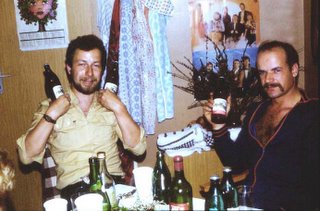
To begin, enjoy Louis Killen's version of "Good Ale", a ballad that dates at least to 1790, which sums up beer's powers, joys and collateral damages. Found on Good Ale, recorded in March 1968.
Robert Burns, a century and a half before, offered another variation:
O, guid ale comes, and guid ale goes,
Guid ale gars me sell my hose,
Sell my hose, and pawn my shoon -
Guid ale keeps my heart aboon!
Rudy Vallee's "Stein Song," from 1930, is your standard beer chant--rousing, dopey, easy to sing even when blitzed. It's the official University of Maine fight song (hear an "updated" choral version here). The song was written in 1904 by Maine undergrads Adelbert Sprague and Lincoln Colcord--Sprague took the melody from a German march called "Opie." Vallee's version is on The Vagabond Lover.
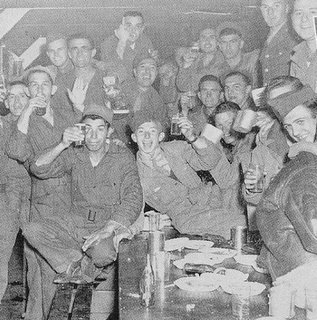
And the good Rev. Frost offers up his countryman, Jacques Brel, whose 1968 ode to beer begins like so:
Ça sent la bière
De Londres à Berlin
Ça sent la bière
Dieu qu'on est bien
The Rev provides a rough translation: "It smells beer from London to Berlin, it smells beer, God we feel good!" It's the sort of song that demands to be slurred loudly by a bar full of people. Found on Infinement.
And to explore the morose side of beer drinking, here are two sad cases:
Jim Ed Brown's "Pop a Top", from 1967, is a pure country music drinking song, sung wonderfully by the underrated Brown. I am of the last generation to remember pull-tab beer cans (and CD longboxes, and McDonald's paper cases, and other wasteful things). Find here.
"We lived on beer and kisses/all hopped up on love and foam." "Beer and Kisses" is off Amy Rigby's 1996 Diary of a Mod Housewife, one of my favorite records from a fairly uninspired decade. John Wesley Harding provides the other lead vocal. (Has the CD gone out print? Seems so.) Amy's tour dates, and other CDs (they're all good).
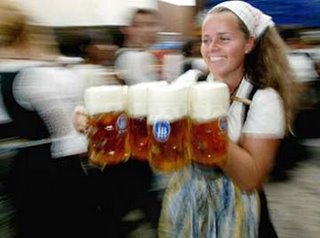
Bad golfer: I lost everything.
Randy: But you have beer now. So you see, sometimes things work out.
My Name is Earl, 2005.
The first beer
There is a farmer living somewhere in what we now call the Middle East, around 9,000 B.C. Let us, for convenience's sake, situate him and his family on the left bank of the Euphrates. Being a farmer is a relatively novel job at this time--it was only a hundred years ago, say, when his people stopped roaming, following the herds, and began cultivating the fields of wild grains that stretch for miles along the river banks.
It is a dry morning and the farmer leaves his home, a simple round hut a few yards in length, whose sagging roof is held up by planks and whose sunken floor is paved with broken stones. He surveys his storage pits and finds that, yet again, his eldest son did not secure the coverings, so the wind has scattered the piles of cereal grains. He, once again, is convinced his son is the product of his wife's copulation with an ass; a belief that grows more fervent when the farmer finds, by a neglected pit, a woven basket filled with half-eaten watery gruel, which his son has apparently left sitting outside for days.
The farmer returns to his hut in order to shove his son's face into the gruel basket, but finds the boy strangely has risen before dawn. So the farmer, his anger ebbing, goes to dump the basket outside but notices a strange, sweet smell coming from it. There is a finger's length of liquid in the basket, which, as he brings it outside to the sunlight, is bubbling slightly, like water from a hot spring. The farmer brings the basket up to his face--he still smells the stale tang of damp grain, but there is something new here.
Curious, he cups a hand and brings a trace of the liquid up to his lips. It is fizzy, it bites his tongue, and is sweeter even than honey. He takes another, larger sip. This makes his face warmer. He takes a third, which stings his nose. A fourth makes him laugh, something that happens so rarely his wife comes out to stare at him. At last, the farmer upturns the basket and drinks every last drop, even chewing the grains. Afterward, he reels around the hut until his wife convinces him to sit on the ground, where he begins to sing.
Unknown to history, he has become the first person ever to get drunk on beer.
A scientific equivalent: When cereal grains are moistened to make gruel, the grains produce diastase enzymes, which in turn convert starch in the grain to maltose--essentially sugar. And when this malt is left exposed to the air, which carries wild yeasts, and baked by the sun, the sugar and yeast merge to form alcohol.
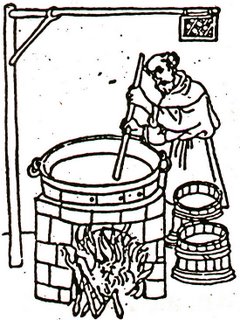
"The mouth of a perfectly contented man is filled with beer," Egyptian proverb, @2,200 BC.
Empires of Beer
By the time of the Sumerians, the first recorded civilization (@3100 BC), beer had become an essential drink, if not the only drink. Beer was safer to imbibe than water, which was often polluted with animal and human filth, and provided a happy buzz to end a wearying day of farming or hunting.
It also was a sign of being civilized. In Gilgamesh, the world's first piece of literature, Enkidu, the "hairy bodied wild man of the grasslands", is presented with beer, which he has never seen before:
"they brought out beer they had brewed and set it down
But Enkidu knew nothing about these things...
(The temple prostitute urges him to eat and drink)
So Enkidu ate his fill of the cooked food
and drank the beer. Seven jugs of the beer
and he was suddenly joyful, and sang aloud."
So Enkidu, happy and drunk, allows himself to be bathed and annointed with oil, puts on clean clothes, and winds up working to guard the community's flocks from wild beasts. Beer is the passport that transforms a savage into a civilized man. It is no coinicidence that the Sumerian symbol for beer is all over the oldest written documents in human history--wage lists and tax receipts.
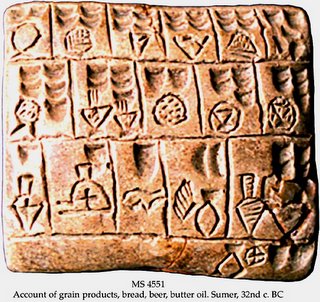
The Egyptians were also heavy beer drinkers--Standage notes that a survey of Eyptian literature found that the Egyptian word for beer (hekt) was mentioned more than any other foodstuff. The Egyptian gods were said to have invented beer, and sometimes got drunk on it. And the laborers who built the pyramids were paid in beer, roughly four liters a day--beer, essentially liquid bread, served as their primary meal.
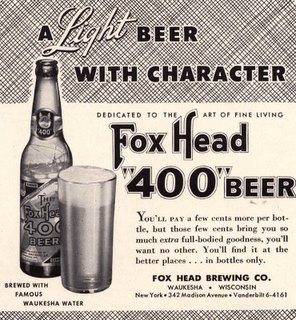
A trace of this legacy can be found in the Replacements' "Beer for Breakfast," an outtake from the Pleased to Meet Me sessions in 1986. The Mats, for the younger set who may not know their legend, were the drunkest band of the 1980s, and sometimes the greatest. On the compilation All for Nothing/Nothing for All.
Grain v. grape
Beer is likely a younger beverage than its great rival, wine, but beer's cultural prominence was established first. Yet when the Roman Empire emerged, taking its gods and its cultural cues from Greece, wine drinking greatly surpassed beer drinking among the civilized, sending brew into the shadows for centuries.
Beer began to be considered a low-class, barbarian drink. For example, when the hapless emperor Valens (later to be slaughtered by the Goths) was attempting to beseige the town of Chalcedon during a minor civil war, he "received a chorus of insults from the walls and the derisive name Sabaiarius--beer swiller," writes Ammianus Marcellinus. "Sabaia is the poor man's drink in Illyricum and is a kind of beer made from barley or some other grain."
(Nor has beer fully shed its rustic image--take "Gimme a Pigfoot and a Bottle of Beer", an ode to low pleasures. Recorded by the likes of Bessie Smith and Billie Holiday, the latter whose 1949 version can be found on this collection of her Decca years.)

Even today there remains a vestige of the great divide in Europe--that of the Romans and the barbarians. The Romans and their long-established provinces--France, Spain, Greece, etc.--were wine drinkers, while beyond the pale, the Germans and Celts brewed beer.
"I was back in beer territory," wrote Patrick Leigh Fermor, detailing a walking trip he made in 1933 to Germany, just after Hitler took power. "One must travel east for 180 miles from the Upper Rhine...to form an idea of the transformation that beer, in collusion with almost nonstop eating, can wreak on the human frame." Still, when Fermor sits down to drink, he finds "the blonde beer inside [his tankard] was cool and marvellous, a brooding cylindrical litre of Teutonic myth." (from A Time of Gifts.)
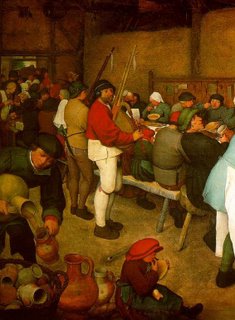
Peasants Wedding, Brueghel (detail)
When the Empire fell, however, beer drinking returned to prominence with the new barbarian masters of the earth. "The Anglo-Saxons consumed beer on an oceanic scale," winces HPR Finberg, in his look at the formation of England. The love of brew extended even to the clergy--Aelfric, the schoolmaster at Cerne Abbey in Dorset, wrote to his pupils that his drink "was beer, or failing that, beer water. Wine is not for the young, but the old and wise."
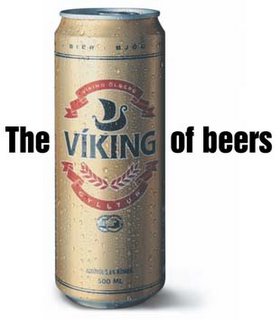
The Dubliners, in "Jug of Porter", emphasize how the Celtish passion for beer begins in the cradle. From 1964's Luke Kelly and the Dubliners.
The Middle Ages introduced the last, critical ingredient to beer--hops, which provide a contrasting bitterness. Hildegard of Bingen, in 1067, provides the first written reference to hops in brewing (though the practice didn't become widespread until the 15th and 16th centuries). A millennium later, in its advertisements, Schlitz would advertise the "last, gentle kiss" of its hops.

Working man's brews
PORTER: Drink, sir, is a great provoker of three things.
MACDUFF: What three things does drink especially provoke?
PORTER: Marry, sir, nose-painting, sleep, and urine. Lechery, sir, it provokes, and unprovokes; it provokes the desire, but it takes away the performance: therefore, much drink may be said to be an equivocator with lechery: it makes him, and it mars him; it sets him on, and it takes him off; it persuades him, and disheartens him; makes him stand to, and not stand to; in conclusion, equivocates him in a sleep, and, giving him the lie, leaves him.
MACDUFF: I believe drink gave thee the lie last night.
Macbeth, II:iii.
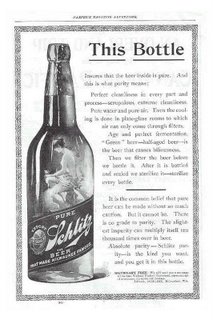
Beer, ever since its use as a payment for Eygptian pyramid builders, has been the classic working class refreshment and as such, beer songs sometimes fall out of favor when musical fashion veers towards greater sophistication or pretension. For example, after a period of fraternity beer anthems in the early 1960s (like "Double Shot of my Baby's Love" or "Louie Louie"), beer songs essentially vanished during the heyday of the hippies.
But country musicians never forsook beer. Big Rock contributes three mighty beer songs:
"A Six Pack to Go", from 1960, is by the great Hank Thompson. Find it here.
"Two Six Packs Away" begins with Dave Dudley shrugging off a painful night of drunk driving. From 1965, on Essential Collection.
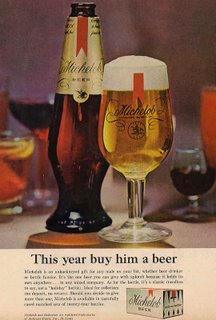
And of course, there is Tommy Duncan's classic "Who Drank My Beer (While I Was in the Rear)". Tommy was Bob Wills' main singer, though this track hails from Duncan's later, solo years (1952--I think). On Beneath Neon Star (pay no mind to the review of some Swede who calls this song "flat".)
Taste antiquity
"[I thought to] try if I could not make some of my barley into malt, and then try to brew myself some beer. This was really a whimsical thought, and I reproved myself often for the simplicity of it: for I presently saw there would be the want of several things necessary to the making my beer that it would be impossible for me to supply; as, first, casks to preserve it in...In the next place, I had no hops to make it keep, no yeast to made it work, no copper or kettle to make it boil; and yet with all these things wanting, I verily believe, had not the frights and terrors I was in about the savages intervened, I had undertaken it, and perhaps brought it to pass too.."
Daniel Defoe, Robinson Crusoe.
To get a sense of what antique beer tasted like, here are a few possible stabs:
King Cnut Ale, brewed once a year by St Peter's, is not brewed with hops, providing you a taste of what beer in the 11th Century might have tasted like. Standage says "it tastes sweet and fruity, rather like wine"; a West Yorkshire beer reviewer is not as positive: "there just appears to be too much going on to get a clear impression...Juniper, orange, herbs and spices too much confusion of flavour. Supposedly an ale from the first millennium. Thank god we've progressed."
Sahti, a Finnish beer, is one of the last surviving "primitive" beers, hailing to the 9th or 10th Century. The beer critic Michael Jackson says of Sahti: "It emerges with not much head, like a traditional Southern English bitter, and has an amberred colour. The flavour is sweetish, with some mint-toffee and banana notes, balanced by a clean, perfumy juniper dryness."
Xingu Black Beer is an attempt to recreate 16th Century brewing techniques from South America.
In the '80s, Anchor Brewery attempted a "Sumerian Beer Project", in which brewers used a recipe from the "Hymn to Ninkasi", @ 1800 BC, to replicate "the first professionally brewed beer"
And an Egyptian Beer Experiment.
Modern Favorites
"What should we drink?" the girl asked. She had taken off her hat and put it on the table.
"It's pretty hot," the man said.
"Let's drink beer."
"Dos cervezas," the man said into the curtain.
"Big ones?" a woman asked from the doorway.
"Yes. Two big ones."
Ernest Hemingway, Hills Like White Elephants.
One of the few societal improvements I have noticed in my lifetime is that there is generally a better, higher-quality range of beer in the grocery stores now (at least in New England). Some current favorites include:
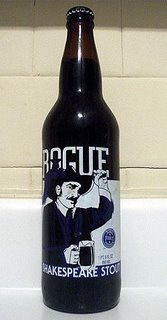
Any Rogue offering, but especially the Shakespeare Stout. Undescribably good. Heavy, with a chocolate aftertaste.
BBC Steel Rail.
John Courage.
People's Pint. Any selection.
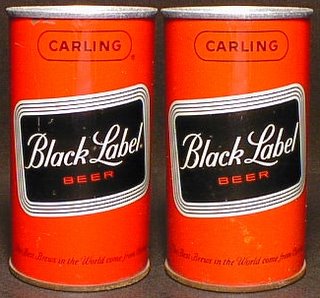
Carling. Yes, I know, the favorite pint of hooligans, but still, I spent two weeks in Ireland living on the stuff and came out fine.
Anything from the Brooklyn Brewery.
Pabst Blue Ribbon. The Gunshy's "$4 Pabst" is on Souls.
Hates:
Bud Ice. Tap water mixed with too much alcohol; good for a cheap high, but really, get some malt liquor if that's where you're headed. When I was in the UK in the late '90s, this swill was on tap in pubs all over the place, for some reason.
Zima. The wine cooler of the beer world.
Heineken. Thankfully has lost its position, held in the 1980s, as a sort of "premium" import beer standard. My thoughts on Heineken reflect Frank Booth's.
Happy Thanksgiving!
No comments:
Post a Comment